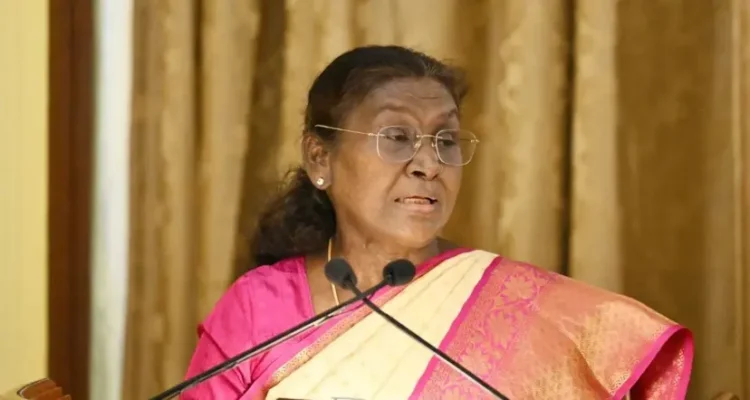President Droupadi Murmu on Tuesday said that by 2050, India aims not only to meet its clean energy targets but also to become a global hub that aggregates solar demand while driving innovation, manufacturing, and knowledge exchange.
Addressing the eighth session of the International Solar Alliance (ISA) Assembly at Bharat Mandapam in New Delhi, President Murmu affirmed that India is on course to becoming a global solar energy hub.
She noted the nation’s progress in achieving renewable energy goals ahead of schedule and outlined a broader vision to unite global solar demand and foster clean energy innovation.
The President described the ISA as a symbol of humanity’s shared aspiration to harness solar energy as a source of inclusion, dignity, and collective prosperity. She urged all Member Countries to look beyond infrastructure and focus on improving lives through solar energy.
She called on the Assembly to design a collective action plan linking solar energy to employment generation, women’s leadership, rural livelihoods, and digital inclusion.
“Our progress should not only be measured through megawatts but through the number of lives illuminated, the number of families strengthened, and the number of communities transformed,” President Murmu said.
“The focus should also be on technology development and on sharing the latest and most advanced technologies with all for maximum benefit.”
Highlighting the urgency of the climate crisis, President Murmu said that climate change affects the entire world and that immediate and decisive steps are essential.
She reaffirmed India’s commitment to combating climate change, noting that the ISA represents a major global step towards addressing this challenge by promoting the adoption and use of solar energy.
She emphasised that inclusion defines India’s development journey, pointing to the country’s success in illuminating homes in remote regions as proof that energy equity forms the foundation of social equity.
Affordable and clean energy, she said, empowers communities, boosts local economies, and creates opportunities beyond access to electricity.
“Solar energy is not merely about power generation but about empowerment and inclusive development,” the President said.
She also stressed that the expansion of large-scale solar installations must ensure the preservation of ecological balance, reminding that environmental conservation is the core reason for the shift towards green energy.
The President urged collective global responsibility, stating that efforts must extend beyond national interests to serve the entire world and future generations.
She expressed confidence that the deliberations and outcomes of the ISA Assembly would mark a milestone in solar energy advancement, contributing to the creation of an inclusive and equitable world.
Speaking on the occasion, Minister of Consumer Affairs and New and Renewable Energy Pralhad Joshi highlighted India’s remarkable transformation from a marginal player to the world’s fourth largest in renewable energy capacity, expanding from 81 GW in 2014 to 257 GW today.
“Under the visionary leadership of Prime Minister Narendra Modi, India achieved its target of 50 per cent energy capacity from non-fossil sources five years ahead of the 2030 deadline, making clean energy both accessible and affordable,” Joshi said.
He added that through transformative initiatives such as PM-KUSUM, PM Surya Ghar Muft Bijli Yojana, PM-JANMAN, and the ‘One Sun, One World, One Grid’ vision, India is leading global efforts to ensure energy justice, empower the poorest communities, and strengthen South-South cooperation.
The ISA, led by India, is a treaty-based intergovernmental organisation that aims to promote a solar-powered future, with a special focus on meeting the energy needs of developing nations.









